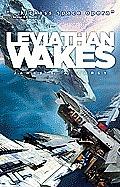
| Series: | The Expanse #1 |
| Publisher: | Orbit |
| Copyright: | June 2011 |
| ISBN: | 0-316-13467-8 |
| Format: | Kindle |
| Pages: | 571 |
Jim Holden is the first officer on a water hauler, making the run from Saturn's rings to the asteroid belt. He used to serve in Earth's space navy, but was too idealistic to be good at obeying authority and working within the system. Now, he's serving with a varied band of misfits and short-timers on a low-prestige, routine route. But the route becomes much less routine when they pick up a mysterious emergency distress beacon that forces them to burn massive amounts of fuel to stop in a remote region of the belt to render aid.
Detective Miller has his own problems with authority, but they're more cynical problems. He's a security officer on Ceres, the largest of the asteroid habitats. He's also a burned-out drunk in a highly political job, with competing pressures of system politics, an employer who is a private security contractor rather than a government police force, and a new unofficial side job of tracking down a high-profile runaway and kidnapping her back to her parents.
James S.A. Corey is a pen name for a collaboration between Daniel Abraham (primarily known for his fantasy Long Price Quartet) and Ty Franck (as yet best known for being George R.R. Martin's assistant). Leviathan Wakes, which is told almost entirely in alternating viewpoints between Holden and Miller, is almost universally referred to as a space opera. That choice of terminology is interesting, since this book is certainly not recognizable as a 1950s space opera. System politics are complex, intricate, and morally grey, with no clear right side. The morality throughout the novel is similarly difficult, playing off Holden's reckless idealism against Miller's poisonous cynicism and lurking despair. Holden always tries to do the right thing, often using a system of ethics that isn't quite up to the complexity of the situation. Miller's attachment to ethics is dubious at best, but that's partly because his deep feel for and understanding of the larger political situation has taught him how pointless ethics often are. The conflict produces sharp ethical dilemmas that would be entirely foreign to the black-and-white world of heroic human space empires conquering a hostile galaxy.
That said, Leviathan Wakes can make a good claim to space opera if by space opera one means Alastair Reynolds, Neal Asher, or one of the other writers of the new British space SF resurgance. It shares with those stories a grittier impression of old machinery, dirty corners, and lived-in spaceships. The setting is a future of widespread human settlement of the solar system and relatively routine interplanatary travel, but one without starships, empires, or super-science. Earth and Mars are the system powerhouses: the huge, established power base of the homeworld and the technologically-savvy upstart competitor. But nearly all of the action takes place in the Belt, where necessity and the sharp edge of scarce water and air produce a tight-knit culture that considers both Earth and Mars to be outsiders and whose partisans are verging on a low-grade terrorist opposition. The politics are engagingly complex and provide much of the tension and dynamism of the plot.
The idea that the SF field has moved forward far enough that this sort of book is now uncontroversially called space opera makes me happy.
On the science fiction front, Leviathan Wakes doesn't break new ground. You've seen all the ideas here before: the outer system as a new frontier, space travel obsessed with mass and delta-V, spinning asteroids as habitats, and the lures and strategems necessary to have firefights in the vastness of space. I won't give away the true driver for the plot, since getting there is much of the fun, but that too is not new ground. Leviathan Wakes shares with much of the new space opera the tendency to draw more on horror and biological intrusion for its aesthetic than the space opera of old, but that's a trend that's decades old at this point.
But although not original, this novel was a lot of fun. It's tense, engrossing, enjoyably twisty, and packs quite a bit of plot into its almost 600 pages. Unlike Reynolds, I never felt like it was wandering or padding the plot, which for a book this long is an accomplishment. I did get annoyed at Miller's depressive ennui at a few points, but Holden was always there to do something boldly ethical, principled, and strategically ill-advised to keep the story moving. I liked the tension that Leviathan Wakes maintained between the expedient and the idealistic, and found myself changing my mind about which approach I agreed with at different points. That's a sign of a well-constructed ethical conflict.
On the negative side, parts of the book verged too far into horror and body integrity violations for me, and I wasn't a huge fan of the ending. The story builds up to a revalatory climax, but the revelation is a fairly old trope in SF and is used in a way that I've seen it used numerous times before. But I liked Holden, I mostly liked Miller, and I enjoyed the twists and turns of the politics and ethics. While I wouldn't vote for it for a Hugo and I doubt it will win, I think I understand why it ended up on the ballot. It's not a ground-breaking book, but it's a fun one, and fun in a way and with a setting that I'd like to see more of in modern SF. If you're in the mood for some good solar-system science fiction with spaceships and habitats and Earth politics extended into space, give it a shot. I'll probably read the sequel.
Oh, and the Kindle version comes with a complete copy of Daniel Abraham's novel The Dragon's Path, which is a nice bonus.
Followed by Caliban's War.
Reviewed: 2012-06-26